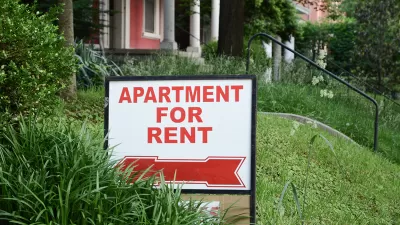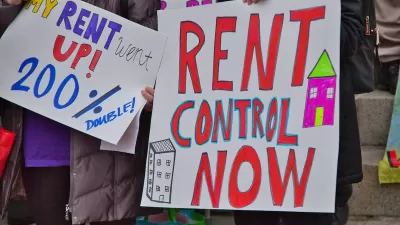Enacted in 2015, Berlin's "Mietpreisbremse" ordinance limits rent increases on some (but not all) apartments. According to this study, results have not been ideal.

"While there's broad agreement among economists that rent control is ineffective and even counterproductive, it still seems like a tempting and direct solution to the problem. What happens when a big city imposes rent control?"
Joe Cortright looks at a study on Berlin's attempt to tamp down rents. Like many U.S. cities, Germany's capital has seen rents rise lately. But in Berlin, a full 85 percent of households are rentals. That means a lot more support for pro-renter policies.
Called Mietpreisbremse (a "brake on rents"), "Berlin's rent control ordinance is a complex one: it's not a freeze on rents per se, but rather a limit on rent increases on existing rental units." Complex rules govern which apartments the law covers.
The policy hasn't been that successful. "The key finding of the Thomschke paper is that the initial enactment of the law has reduced rents in rent-controlled flats compared to those not included in the scheme, but the effects have been less than the law intended." In fact, the law tended to lower prices only on luxury apartments. That ironic result, Cortright says, is "a stark reminder that while posed as a way of promoting affordability for low income households, in practice, rent control may actually provide greater benefits for higher income renters."
FULL STORY: Does rent control work? Evidence from Berlin

Alabama: Trump Terminates Settlements for Black Communities Harmed By Raw Sewage
Trump deemed the landmark civil rights agreement “illegal DEI and environmental justice policy.”

Planetizen Federal Action Tracker
A weekly monitor of how Trump’s orders and actions are impacting planners and planning in America.

The 120 Year Old Tiny Home Villages That Sheltered San Francisco’s Earthquake Refugees
More than a century ago, San Francisco mobilized to house thousands of residents displaced by the 1906 earthquake. Could their strategy offer a model for the present?

In Both Crashes and Crime, Public Transportation is Far Safer than Driving
Contrary to popular assumptions, public transportation has far lower crash and crime rates than automobile travel. For safer communities, improve and encourage transit travel.

Report: Zoning Reforms Should Complement Nashville’s Ambitious Transit Plan
Without reform, restrictive zoning codes will limit the impact of the city’s planned transit expansion and could exclude some of the residents who depend on transit the most.

Judge Orders Release of Frozen IRA, IIJA Funding
The decision is a victory for environmental groups who charged that freezing funds for critical infrastructure and disaster response programs caused “real and irreparable harm” to communities.
Urban Design for Planners 1: Software Tools
This six-course series explores essential urban design concepts using open source software and equips planners with the tools they need to participate fully in the urban design process.
Planning for Universal Design
Learn the tools for implementing Universal Design in planning regulations.
Clanton & Associates, Inc.
Jessamine County Fiscal Court
Institute for Housing and Urban Development Studies (IHS)
City of Grandview
Harvard GSD Executive Education
Toledo-Lucas County Plan Commissions
Salt Lake City
NYU Wagner Graduate School of Public Service





























